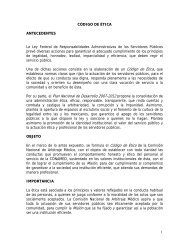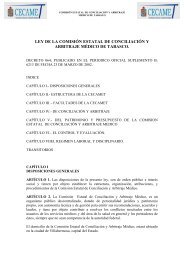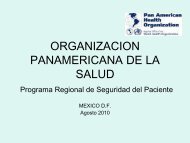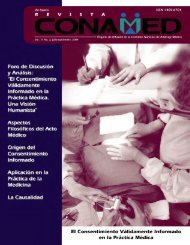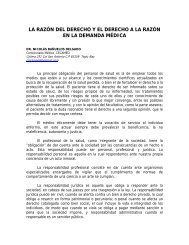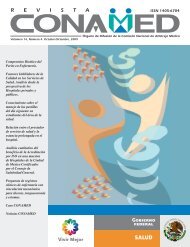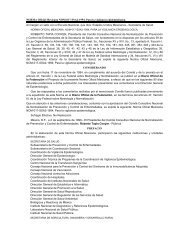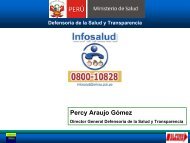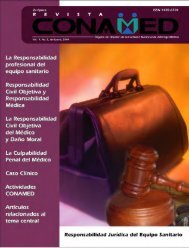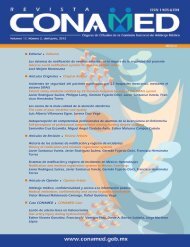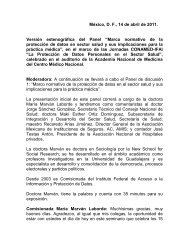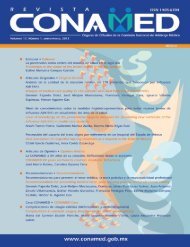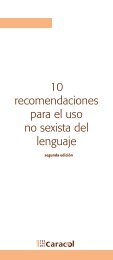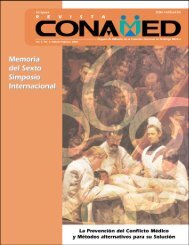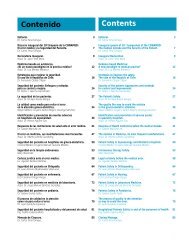www.conamed.gob.mx
www.conamed.gob.mx
www.conamed.gob.mx
You also want an ePaper? Increase the reach of your titles
YUMPU automatically turns print PDFs into web optimized ePapers that Google loves.
R E V I S T A<br />
Rev CONAMED 2010; 15 supl.1: 30-34.<br />
RESUMEN<br />
Estimulación temprana en niños menores de 2 años<br />
en la Ciudad de Durango<br />
Introducción. La estimulación temprana es el grupo de<br />
técnicas especiales que fomentan el desarrollo psicomotor,<br />
social y del lenguaje en niños. Se reconoce que el bienestar<br />
de los niños depende en gran medida de lo que sus<br />
padres y otros miembros de su entorno están haciendo o<br />
podrían hacer por ellos. El objetivo fué diferenciar el nivel<br />
de desarrollo y los cambios del grupo control al del grupo<br />
experimental al cual se le aplicó estimulación temprana de<br />
acuerdo a la edad y a las necesidades de los niños.<br />
Material y métodos. Estudio correlacional, experimental<br />
con un eje longitudinal que cuenta con un universo de<br />
30 niños menores de 2 años. Instrumento: DENVER-SEMÁ-<br />
FORO 30 que cuenta con 123 Ítems, más una ficha de identificación<br />
de 10 Ítems. resultados: Se aplicó el instrumento<br />
a un grupo control y un grupo experimental. El grupo experimental<br />
obtuvo un mayor porcentaje de desarrollo en:<br />
Motor Grueso 46%, Motor Fino 40%, Área Social 27%, Lenguaje<br />
33%.<br />
Conclusiones. La estimulación temprana es un medio<br />
eficaz para potencializar al máximo las habilidades en el desarrollo<br />
no sólo del niño con déficit neurológico sino también<br />
en el niño sano y más aun en condiciones marginales.<br />
Palabras clave. Estimulación Temprana, Desarrollo Psicomotriz,<br />
desarrollo social, desarrollo de lenguaje.<br />
Early stimulation of children under 2 years old<br />
in the City of Durango<br />
1 Hospital General del estado de Durango.<br />
2 Facultad de Enfermería de la Universidad Juárez del Estado de Durango.<br />
Juan Manuel Ramírez-Salazar 1 , Martha Lilia Parra-Domínguez 2<br />
ABSTRACT<br />
Artículo Original<br />
Introduction. Early stimulation is the group of special<br />
techniques that promote the psychomotor, social and<br />
language in children. It is recognized that the welfare of<br />
children depends largely on what their parents and other<br />
members of his entourage are doing or could do for them.<br />
The objective was to differentiate the level from development<br />
and the changes of the group control to the one of<br />
the experimental group to which I am applied early stimulation<br />
to him according to the age and to the needs of the<br />
children.<br />
Material and methods. A correlational, experimental<br />
with a longitudinal axis which has a universe of 30 children<br />
younger than 2 years. Instrument: DENVER-LIGHT 30<br />
which has 123 items, more a form of identification of 10<br />
Items. Results: We applied the instrument to a control group<br />
and an experimental group, the experimental group had a<br />
higher percentage of development: 46% Gross Motor, Fine<br />
Motor 40%, 27% Social Area, Language 33%.<br />
Conclusions. Early stimulation is an effective way to<br />
potentiate the best skills in the development not only of children<br />
with neurological deficit but also in the healthy child,<br />
and even more marginal conditions.<br />
Key words. Early stimulation, less than two years old,<br />
psychomotor development, social development, language<br />
development.<br />
Artículos recibidos 28 de julio 2010; Primera revisión 26 agosto de 2010; Aceptado 30 de septiembre de 2010.<br />
Correspondencia: MCE. Martha Lilia Parra-Domínguez, Calle Mina Magistral del Oro 217, Fracc. Acereros C.P. 34030 Durango, Dgo. Correo<br />
electrónico: monikg91@hotmail.com.<br />
S30<br />
Revista CONAMED, Suplemento de Enfermería 2010<br />
ISSN 1405-6704



